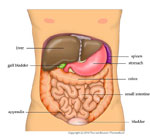A recent study shows that acupuncture is an effective treatment for Crohn’s disease. The study was conducted by researchers at the Shanghai University of Traditional Chinese Medicine and the Shanghai Research Institute of Acupuncture and Moxibustion and was published in the Journal of Acupuncture and Tuina Science. The objective of the study was to determine the effects of acupuncture on intestinal fibrosis in cases of Crohn’s disease. The researchers measured the effects of acupuncture on basic fibroblast growth factor (bFGF) and type I collagen (Col I) in the intestines of laboratory rats with Crohn’s disease. After the use of acupuncture, the expressions of Col I and bFGF reduced markedly in rats with Crohn’s disease. The research proved that acupuncture treatment reduces abnormally high levels of these substances. By reducing the abonormally high levels of Col I and bFGF, acupuncture prevents fibrosis in the intestines of those with Crohn’s disease.
Acupuncture Points
Acupuncture was applied at points St25 (Tianshu) and CV6 (Qihai). Electroacupuncture and moxibustion were applied in different groups. A separate control group did not receive acupuncture. The electroacupuncture and moxibustion groups showed marked improvement whereas the control group did not. The study shows that acupuncture and moxibustion reduce excessive deposition thereby treating fibrosis in patients with Crohn’s disease.
About Crohn's
Crohn’s disease (regional enteritis) is an inflammatory disease of the intestines. It can affect any area of the GI tract from the mouth to the anus. Common symptoms include diarrhea, abdominal bloating and pain, vomiting, weight loss, eye disorders, arthritis, dermatological disorders, and fatigue. Crohn’s disease is considered to be an autoimmune system disorder of the GI tract. Genetics may play a role in its etiology, however, there is significant evidence that environmental factors contribute to this pathology. Smokers are approximately twice as likely to develop Crohn’s disease. No western medicine cure exists for Crohn’s disease and therefore most MD’s focus on controlling the symptoms. Crohn’s disease may cause growth failure in children and increases the risk of cancer in the affected regions of the intestines.
Ulcerative Colitis
Crohn’s disease is often confused with ulcerative colitis. Crohn’s disease commonly affects the terminal ileum and the colon. Ulcerative colitis rarely affects the terminal ileum and always affects the colon. Crohn’s disease commonly affects the anus and ulcerative colitis rarely affects the anus. Crohn’s disease causes patchy or serpiginous (snake-like) ulcerations of the intestines whereas ulcerative colitis causes a continuous area of ulceration. Ulceration is shallow with ulcerative colitis but is deep with Crohn’s disease. As a result, Crohn’s disease may cause stenosis of the intestines. The study shows that acupuncture prevents fibrosis of the intestines thereby helping to prevent stenosis.

Reference:
Chen Zhao, Juying Ding, Jindan Ma, Linying Tan, Huangan Wu, Yingying Zhang and Linshan Zhang, Acupuncture on the basic fibroblast growth factor and type I collagen in colons of rats with Crohn’s disease, JOURNAL OF ACUPUNCTURE AND TUINA SCIENCE, Volume 9, Number 1, 1-6.

